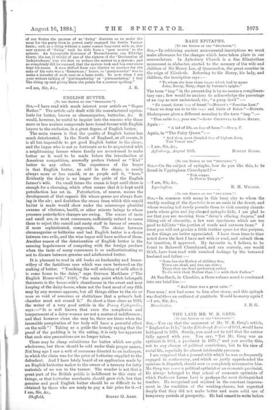RARE EPITAPHS.
[To THE EDITOR OF THE " SPECTATOR."]
SIR,—In criticising ancient monumental inscriptions we must make allowance for the changes which have taken place in our nomenclature. In Aylesbury Church is a fine Elizabethan monument in alabaster, erected to the memory of the wife and children of Sir Henry Lee, of Quarrendon, the great courtier in the reign of Elizabeth. Referring to Sir Henry, his lady, and children, the inscription says :—
" To whom she bore three impes which had to name John, Henry, Mary, slayn by fortune's spight."
The term " imp " in the present day is by no means a complimen- tary one ; few would be anxious to acknowledge the parentage of an imp as now understood, viz., "a puny devil" :- " Fit vessel, fittest imp of fraud."—MILTON'S " Paradise Lost."
" Such wo deny not to be the imps and limbs of Sattin."—HOOKER. Shakespeare gives a different meaning to the term "imp " :— " That noble imp, your son."—LORD CROMWELL to KING HENRY.
Again :— "A lad of life, an imp of fame."—Henry F.
Again, in "The Fairy Queen" :-
" Ard thou, most dreaded imp of highest Jove, Fair Venus' son."
—I am, Sir, &e.,


































 Previous page
Previous page